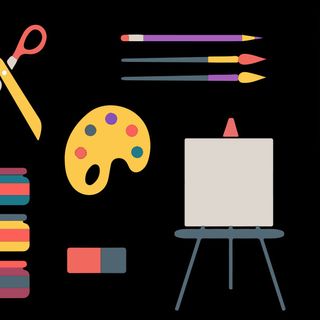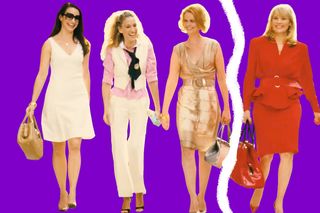
The SATC Feud and the Myths of Female Friendship
I grew up with Sex and The City. There is a generation of us SATC girls who classified ourselves as Mirandas, Charlottes, Carries and Samanthas. We all believed in BFFs and sistas before mistas, and more. And then...

I grew up with Sex and The City. There is a generation of us SATC girls who classified ourselves as Mirandas, Charlottes, Carries and Samanthas. We all believed in BFFs and sistas before mistas, and more.
And then we grew up, thankfully realizing that women are humans too. That when any humans interacted in any sphere, a multitude of pleasant and non-pleasant reactions could result. And especially when human beings interacted in a professional sphere, there was no guarantee, and no need really, to expect that undying friendship would be the result.
And yet, here we are. Twenty years later. Still expecting women to be friends, and making a big deal if they aren’t.
I’m referring, of course, to the entire Kim Cattrall-Sarah Jessica Parker fiasco, described by the media as a ‘feud’ and being played as some sort of insane catfight between the two actors. For a few months now, reports, attributed to Sarah Jessica Parker’s (SJP) camp, have been circulating that blame Kim Cattrall for refusing to agree a third installment of the SATC movie series. Cattrall refuted the reports. Lots of internet space was devoted to it. Then Cattrall recently lost her brother in a sudden, tragic way. And SJP commented on his death on social media, expressing her condolences, as well as allegedly referencing the tragedy in an interview. Cattrall then publicly asked SJP to get out and stay out of her life. The internet exploded.
And it’s not just Hollywood. Bollywood’s had its share of much-reported “omg catfight” moments between female actors like Rekha and Jaya Bachchan, Sonam Kapoor and Aishwarya Rai, Sonam Kapoor and everyone else, Kareena Kapoor and Bipasha Basu, Kareena Kapoor and everyone else, Deepika Padukone and Katrina Kaif, and more.
It might be human nature to bring out the popcorn to watch celebrities fight. But we don’t see nearly as much or even half the amount of coverage about men feuding. George Clooney fought with David O Russell on the sets of Three Kings and refused to work with him again. Did anyone post OMG emojis over that? Dwayne ‘The Rock’ Johnson feuded with Vin Diesel and Tyrese Gibson on the sets of Fast and Furious 8, but it was barely a flutter compared to the attention Cattrall and SJP are getting. In Bollywood, the only male feud that was really reported with any regularity was the Salman Khan and Shah Rukh Khan feud, which was treated with some sort of reverence and frustration: “But why aren’t they getting along, we love them, please don’t fight bhais!”
Talking about a feud between two female stars on Glee, Ryan Murphy, the maker of Feud and Glee, admitted, “There were many boys on [Glee] that didn’t get along. And you never hear about that. You never hear about that in our culture.”
When they part ways professionally, the media seems to want to force women into best friendship… or a knock-out, drag-down feud. Says Murphy, about his series, “It really was about, if these two women sat down and had a 10-minute conversation, they would’ve been best friends.” But why should they be best friends? Why does the world insist on acting like some antiquated friendship broker and keep insisting that we should all play nice? Why can’t we accept that people, and especially women, can work together and not feel the need to braid each other’s hair after?
Plenty of colleagues argue in the workplace, but the way women’s professional relationships are portrayed is different from how mens’ are framed. Both The Rock and Cattrall were open about not having a personal friendship with a co-worker whose behavior they didn’t appreciate in the workplace. This seems like a reasonable privilege that we should all enjoy. But The Rock is portrayed as macho, while Cattrall and SJP are repeatedly hashtagged with #MeanGirls.
And so once the veil of perfect female friendship has been pierced, conflicts between women are routinely brought down to a Defcon Schoolyard Recess level. Human beings in every sphere have varying levels of mistrust, loathing, aggression and love. Even when the media covers female friendships, it’s with a sense of how-long-will-this-last or disbelief. We just can’t believe that women are okay or supportive of each other. If they are, we try to find reasons of race, income, benefit or more to explain it. Is it because we want to pigeonhole women into being ‘nice’ all the time? To be bots who look good, don’t make a fuss and don’t fight?
To young women entering the workforce, these examples are inherently unhealthy. For women everywhere, the intense scrutiny surrounding female friendships instantly puts them on their guard. And more than ever now, support and encouragement is what women need.
Cattrall described her relationship with her SATC co-stars in simple terms. “We’ve never been friends,” she said. “We’ve been colleagues and in some ways that’s a very healthy place to be because then you have a clear line between your professional life and relationship and your personal.” #goals
And why did Cattrall need to defend her professional behaviour with her coworkers and explain why they weren’t having pillow fights every night? Because society views women through extremist viewpoints. And this has been through centuries. If you were a witch, pre-Salem of course, you could be a maiden, mother or crone. If you were a lover, you were either Madonna or whore. If you’re in a group of women, you’re either friends sitting around in cutesy pajamas and having a slumber party or you’re in the mud, wrestling each other for supremacy.
Antagonistic or congenial, female relationships across personal and professional are seemingly defined by the male gaze. Female conflict, in particular, seems to be viewed salaciously, thirstily, with even men in normal, everyday workplaces being eager to hear why two women might be feuding. Male conflict is viewed with silence, fear and even caution – my private opinion being that over history, we’ve realised that when men fight, they drag us all down with them.
We spend more time tearing women and their equations down, and reveling in that, instead of celebrating women who keep personal and professional lives separate and are able to function in multiple spheres with aplomb. Says Susan Sarandon, who plays Bette Davis in Feud, “In Bette’s time, the [Hollywood power brokers] really knew how to pit these women against each other, so that they had more control over them. They couldn’t afford for women like Bette and Joan to join forces. In that time, women always aligned themselves with the power, which meant they aligned themselves with men. They saw other women as threats.” She also goes on to say that thankfully, that’s changed now – an internal change amongst us, that has to, must, and will ripple outwards.
Fasten your feud seatbelts, media. It’s going to be a bumpy ride forward.
Akhila Vijaykumar is a writer with experience across advertising and journalism. Occasionally, the crossover does make her demand truth from soap and try to cajole quotes into starbursts, but no harm no foul. She loves books by Terry Pratchett, dogs and pizza, often at the same time.
Related


Closing the STEM Gender Gap, One Toy at a Time
